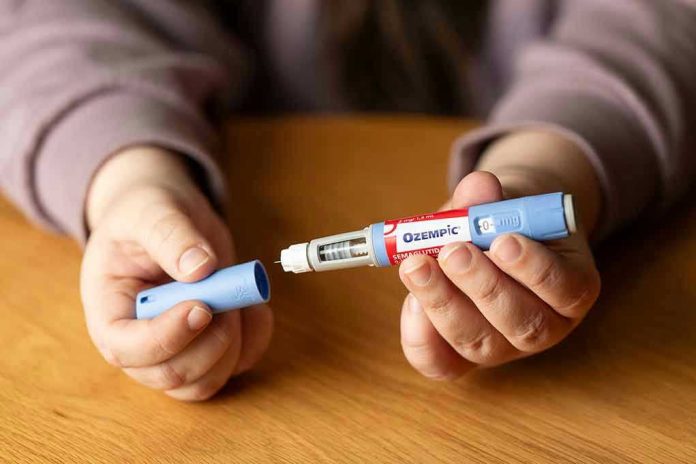
As a new weight-loss injection claims up to 20% body fat reduction in trials, experts warn that Big Pharma’s latest “miracle” shot could bring unintended risks and raise serious questions about medical overreach and long-term safety.
Story Snapshot
- Eloralintide, a new injectable drug, demonstrated up to 20% weight loss in adults with obesity in a Phase 2 trial.
- The drug works via amylin receptor agonism, a novel mechanism distinct from current popular GLP-1 therapies like Ozempic and Wegovy.
- Experts urge caution, highlighting side effects, lack of long-term data, and the need for more comprehensive obesity solutions.
- Eloralintide is not yet FDA-approved, and further trials are set for late 2025.
Drugmakers Race Ahead of Regulators with Powerful New Weight-Loss Shot
Eli Lilly has unveiled eloralintide, a once-weekly injectable targeting the amylin receptor, marking a major shift in the pharmaceutical approach to obesity. In a 48-week Phase 2 clinical trial of 263 adults with overweight or obesity (but not diabetes), participants lost an average of up to 20% of their body weight. This rate of loss exceeds many current therapies, including the highly touted GLP-1 drugs, and positions eloralintide as a possible game-changer in the weight-loss market.
Pharmaceutical innovation is surging as the obesity epidemic continues to strain American families, health care systems, and the economy. While GLP-1 drugs like Ozempic and Wegovy have dominated headlines, eloralintide’s mechanism—amylin receptor agonism—offers an alternative pathway for those who either cannot tolerate or do not respond to existing options.
This development comes amid relentless demand for effective, tolerable, and accessible obesity therapies as comorbidities like hypertension and diabetes soar. Yet, every new “miracle” drug also brings heightened scrutiny, especially from those concerned about the medicalization of weight loss and the broader social and constitutional implications of government and industry intervention in personal health choices.
Expert Caution: Promising Results, But Warnings Echo from the Past
While the clinical trial results are impressive—showing not just weight loss but improvements in waist circumference, blood pressure, and cholesterol—medical experts are sounding alarms. They warn that most side effects, such as gastrointestinal distress and fatigue, are dose-dependent, and the long-term risks remain unknown.
Past weight-loss drugs have been pulled from the market due to severe adverse events, and experts stress the need for robust long-term safety data, especially as eloralintide is not yet FDA-approved. The medical community also highlights that sustainable obesity treatment requires more than pharmaceutical fixes, emphasizing individualized plans, lifestyle changes, and cautious optimism about new drugs.
Industry voices, including Dr. Liana K. Billings, the trial’s lead author, caution that while the weight loss is “clinically impactful,” there has yet to be a plateau, raising further questions about the limits and safety of prolonged use.
Longevity experts warn about potential malnutrition and the risks of over-reliance on pharmaceutical interventions. Others note that targeting multiple biological pathways may help some patients, but only time and additional research will clarify who truly benefits—without trading one set of health problems for another.
Regulatory and Societal Concerns: Oversight, Access, and the American Way
Eloralintide’s rapid progress through clinical trials and plans for Phase 3 studies by the end of 2025 illustrate the breakneck pace of pharmaceutical innovation, but also the need for vigilant regulatory oversight. The FDA has not approved the drug, and the long-term effects on muscle mass, metabolic health, and overall well-being are still unclear.
Conservative Americans, already wary of government overreach and Big Pharma’s influence, have reason to scrutinize how new drugs are evaluated, marketed, and made accessible.
There are broader concerns that a focus on pharmacological “fixes” could distract from addressing root causes of obesity—such as food policy, lifestyle, and community health—while opening the door to further medical mandates or insurance-driven rationing of care.
Beyond personal health, the growth of the weight-loss drug market raises questions about the economic and social impacts, including insurance coverage, drug pricing, and the potential for new forms of stigma or discrimination.
As the pharmaceutical industry seeks to combine multiple drugs for greater effect, the importance of maintaining individual liberty, informed consent, and the constitutional right to make personal health decisions becomes even more critical. Americans must remain vigilant to ensure that rapidly evolving medical science does not erode foundational values or open the door to coercive policies in the name of public health.
Looking Forward: Innovation, Accountability, and Conservative Principles
The development of eloralintide reflects both the promise and peril of medical innovation in 2025. While new tools in the fight against obesity can potentially help millions, the rush to embrace pharmaceutical solutions—often at the urging of powerful industry interests—demands careful scrutiny.
Conservative Americans know that real progress respects individual choice, limits government and corporate overreach, and puts family and constitutional values first. As clinical trials continue and policymakers debate the future of obesity treatment, vigilance and accountability must guide every step to ensure that medical progress does not come at the expense of American liberty or common sense.
Sources:
New weight-loss shot shows major fat reduction, but experts urge caution
New weight-loss drug once weekly 20% weight loss trial eloralintide
Beyond GLP-1: The next wave of weight-loss medication innovation
Weight-loss drugs: what’s coming next?
New GLP-1 therapies enhance quality weight loss improving muscle
GLP-1 and health beyond weight loss in the Ozempic era




